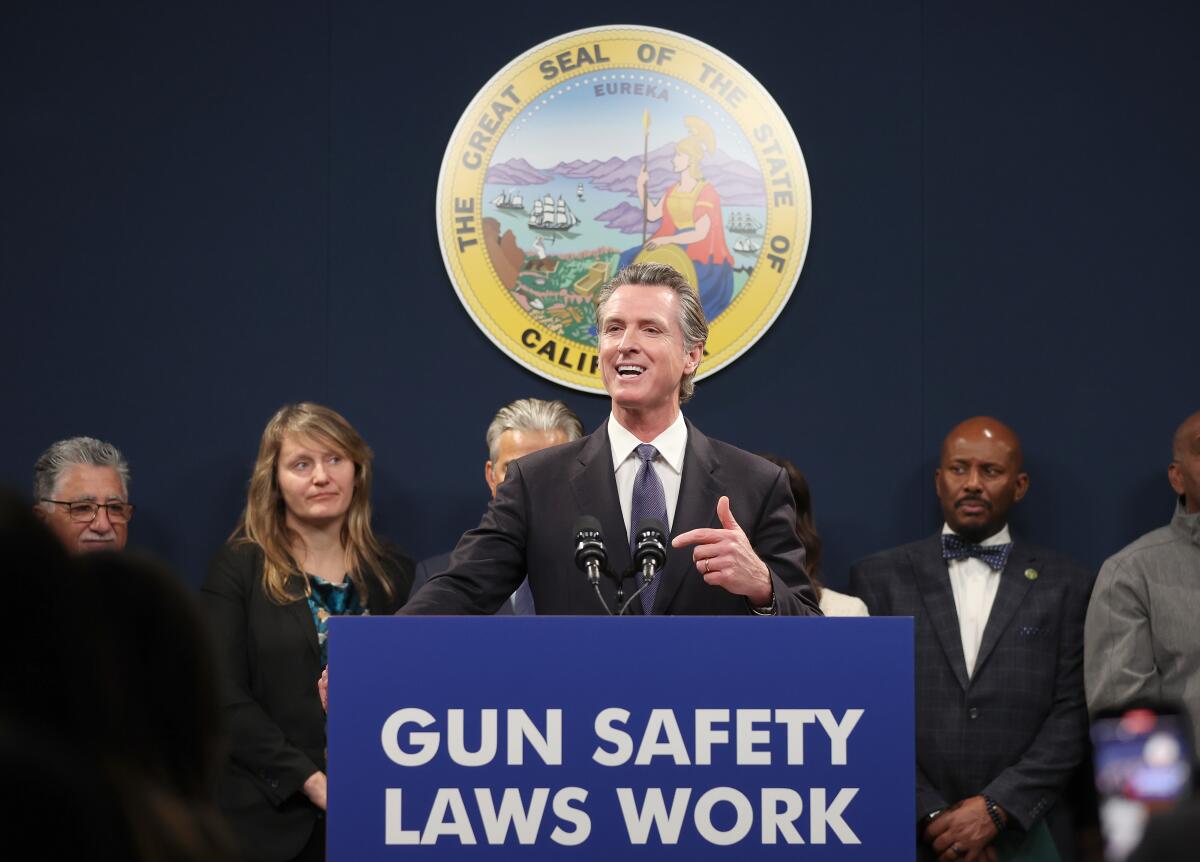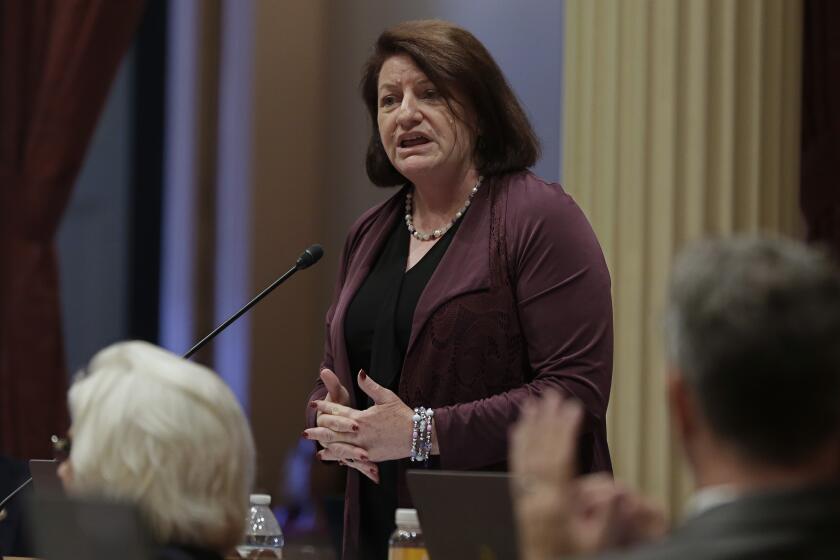Opinion: California takes on a new responsibility in U.S. politics: Enlightening the rest of the country

- Share via
The first maps that European explorers drew of California showed it as an island. It was fully detached, separated by a wide gulf from the rest of the continental landmass, standing apart from the rest of the New World. This is both one of the most famous cartographic mistakes in history and one of the most telling. Later, ever since California became a state, residents have viewed their land and their politics as a world apart.
This was never more true than during the Trump era. When national politics lurched right, the state moved to isolate itself to protect its progressive policies. The day after Donald Trump’s election, California’s legislative leaders wrote, “Today, we woke up feeling like strangers in a foreign land” but called their state “a refuge of justice and opportunity,” vowing that “California will defend its people and our progress.” California declared itself a sanctuary state to protect immigrants and enacted a ban on government-funded travel to states with anti-LGBTQ policies.
Three recent announcements signal a shift in the Island of California’s approach. First, legislative leader Toni Atkins called to end California’s travel ban, replacing it with an ad campaign promoting acceptance and inclusion in the 23 red-leaning states that had been off limits. Before she moved to California and rose to historic heights — becoming the first person in over a century to serve as both speaker of the state’s Assembly and leader of its Senate — Atkins grew up in rural Virginia.
California’s boycott on state-funded travel to anti-LGBTQ states closes down communication rather than opening it up.
Reflecting on her roots, she said she has come to believe “that the way to change people’s minds is to have impact and direct contact and to open hearts and minds. … Polarization is not working. We need to adjust our strategy.”
Doubling down on this approach, Gov. Gavin Newsom announced a political action committee, seeded with $10 million that he never needed to spend as he cruised to reelection in this blue bastion, that is designed to “take the fight to the red states.” The idea is to make the case for California values and the progressive policies that put them into action, holding his state up as a counterpoint to the conservative locales that have pushed the nation rightward on abortion, guns and voting restrictions. In the first week after his announcement, Newsom visited Arkansas, Mississippi, Alabama, Florida and the MSNBC studios. It’s a counteroffensive in the culture wars, with California leading the charge.
Third, Democratic leaders across the state are taking action since the bans on abortion put in place elsewhere after the Dobbs decision last summer. These officials have pushed a concrete set of policies to convey California’s freedoms to those from other states. In Sacramento, legislators have introduced 17 bills this session that would “further the protections to people who may end up coming to our state” for abortions. After a federal judge in Texas issued a ruling aimed at restricting abortion medication, the state moved to create a stockpile of 2 million pills, and L.A. County Supervisor Lindsey Horvath affirmed that “anyone who comes to Los Angeles County will be safe, you will be protected.”
Similarly, in response to red-state attacks on trans people, Californians are seeking to ensure that our state’s doctors can provide gender-affirming care to patients from across the nation.
We’re past the era of ‘It’s the economy, stupid.’ Now elections are decided by hot-button issues. California’s governor knows Democrats can win if they set the terms of engagement.
Rather than walling off the state as a sanctuary against Trump-era policies, California’s leaders are actively positioning it as a haven that red-state residents can visit to seek gender-affirming care or reproductive care.
Is this a fight to change policies, or a battle to win the narrative? It’s both. Atkins’ idea is that to change laws in rural areas, you must first change hearts and minds. The direct contact she prescribes could come through state employees traveling to other states again, or from those who travel to California to seek out its social freedoms. The hope is that each type of interaction will set off a chain reaction that shifts opinions, and eventually policies, across America.
Will it work? There are reasons to believe in and to doubt this project. California absolutely possesses the policymaking expertise to craft laws and regulations that become models for other states to follow. It’s long been a leader in areas such as reducing greenhouse gas emissions, protecting internet privacy, regulating autonomous cars, controlling gun and ammunition sales and safeguarding voting rights. More and more, our lawmakers strive to pass first-in-the-nation laws like those providing universal school meals and allowing college athletes to profit from their name, image and likeness, then actively advocate for other states to follow along with them. In an era of ever-more-nationalized politics, shining a light on the policies that California is exporting is a necessary step in changing the national conversation.
The next step is recognizing how the rest of America sees us at this moment. Here, humility is in order. Our state’s reputation is at a low point, at least among red voters who see only crime and homelessness here on cable news and social media. Just as we saw in the mid-1990s and during the Great Recession, we are losing population to other states.
So before they tell other states that they should pass all of our policies, California’s leaders need to make a clear case for their benefits. California’s economy grew rapidly, outpacing many of our red-state rivals, at the same time that we passed many progressive policies over the past two decades. The economy rebounded strongly from the pandemic at the same time that we saw much lower disease and death rates than places like Florida and Texas. And from Silicon Valley to L.A. to San Diego, California businesses continue to attract the lion’s share of venture capital to build toward the future.
It’s certainly true that President Biden’s agenda is limited by Republicans in Washington, but Sacramento has the Democratic supermajorities to get things done. That’s a serious responsibility and a valuable opportunity — now that California is no longer positioning itself as an ideological island.
Thad Kousser is a professor of political science and the co-director of the Yankelovich Center for Social Science Research at UC San Diego.
More to Read
A cure for the common opinion
Get thought-provoking perspectives with our weekly newsletter.
You may occasionally receive promotional content from the Los Angeles Times.











